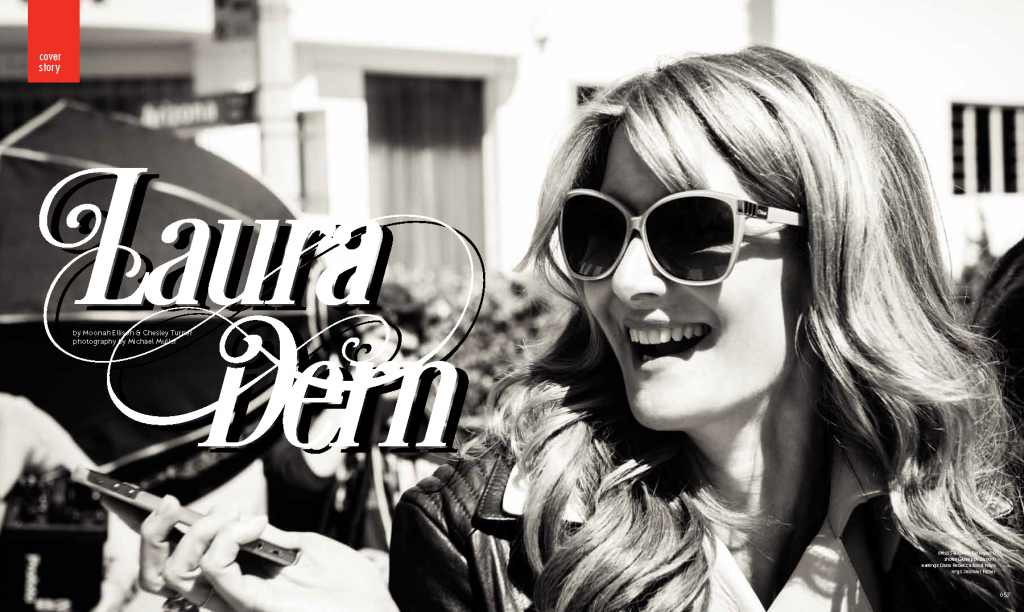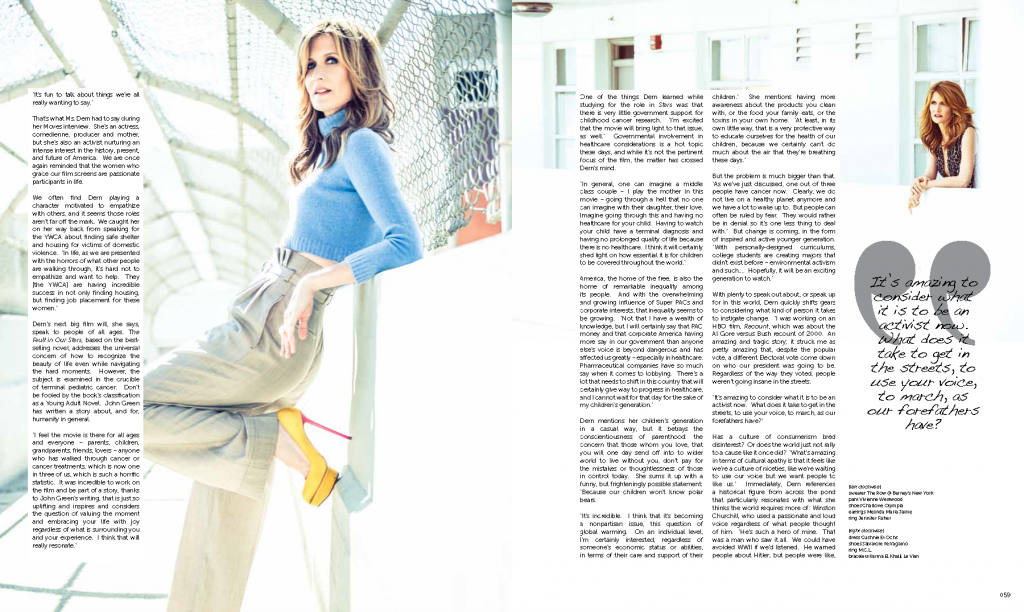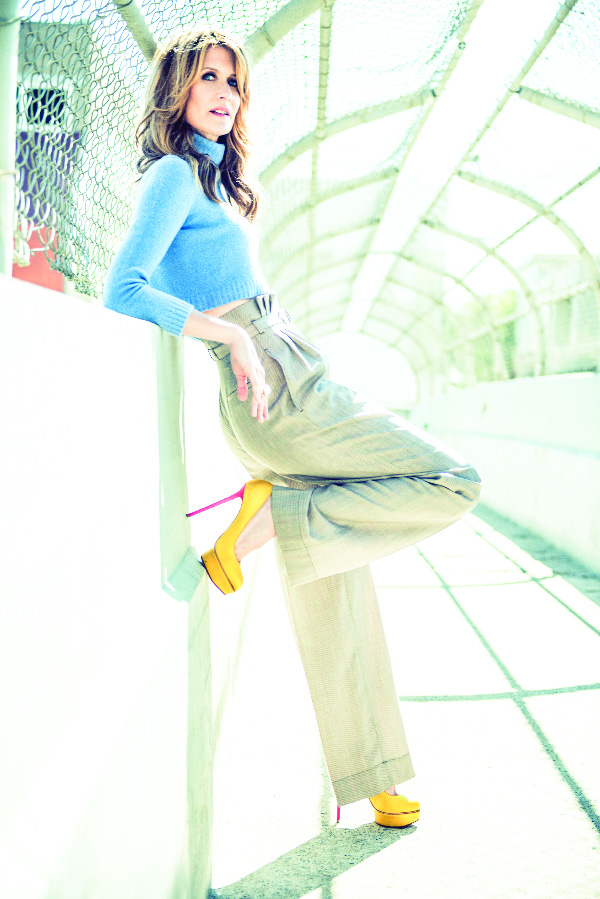



by Moonah Ellison & Chesley Turner
photography by Michael Muller
“It’s fun to talk about things we’re all really wanting to say.”
That’s what Ms. Dern had to say during her Moves interview. She’s an actress, comedienne, producer and mother, but she’s also an activist nurturing an intense interest in the history, present, and future of America. We are once again reminded that the women who grace our film screens are passionate participants in life.
We often find Dern playing a character motivated to empathize with others, and it seems those roles aren’t far off the mark. We caught her on her way back from speaking for the YWCA about finding safe shelter and housing for victims of domestic violence. “In life, as we are presented with the horrors of what other people are walking through, it’s hard not to empathize and want to help. They [the YWCA] are having incredible success in not only finding housing, but finding job placement for these women.”
Dern’s next big film will, she says, speak to people of all ages. The Fault in Our Stars, based on the best-selling novel, addresses the universal concern of how to recognize the beauty of life even while navigating the hard moments. However, the subject is examined in the crucible of terminal pediatric cancer. Don’t be fooled by the book’s classification as a Young Adult Novel. John Green has written a story about, and for, humanity in general.
“I feel the movie is there for all ages and everyone – parents, children, grandparents, friends, lovers – anyone who has walked through cancer or cancer treatments, which is now one in three of us, which is such a horrific statistic. It was incredible to work on the film and be part of a story, thanks to John Green’s writing, that is just so uplifting and inspires and considers the question of valuing the moment and embracing your life with joy regardless of what is surrounding you and your experience. I think that will really resonate.”
One of the things Dern learned while studying for the role in Stars was that there is very little government support for childhood cancer research. “I’m excited that the movie will bring light to that issue, as well.” Governmental involvement in healthcare considerations is a hot topic these days, and while it’s not the pertinent focus of the film, the matter has crossed Dern’s mind.
“In general, one can imagine a middle class couple – I play the mother in this movie – going through a hell that no one can imagine with their daughter, their love. Imagine going through this and having no healthcare for your child. Having to watch your child have a terminal diagnosis and having no prolonged quality of life because there is no healthcare. I think it will certainly shed light on how essential it is for children to be covered throughout the world.”
America, the home of the free, is also the home of remarkable inequality among its people. And with the overwhelming and growing influence of Super PACs and corporate interests, that inequality seems to be growing. “Not that I have a wealth of knowledge, but I will certainly say that PAC money and that corporate America having more say in our government than anyone else’s voice is beyond dangerous and has affected us greatly – especially in healthcare. Pharmaceutical companies have so much say when it comes to lobbying. There’s a lot that needs to shift in this country that will certainly give way to progress in healthcare, and I cannot wait for that day for the sake of my children’s generation.”
Dern mentions her children’s generation in a casual way, but it betrays the conscientiousness of parenthood: the concern that those whom you love, that you will one day send off into to wider world to live without you, don’t pay for the mistakes or thoughtlessness of those in control today. She sums it up with a funny, but frighteningly possible statement: “Because our children won’t know polar bears.
“It’s incredible. I think that it’s becoming a nonpartisan issue, this question of global warming. On an individual level, I’m certainly interested, regardless of someone’s economic status or abilities, in terms of their care and support of their children.” She mentions having more awareness about the products you clean with, or the food your family eats, or the toxins in your own home. “At least, in its own little way, that is a very protective way to educate ourselves for the health of our children, because we certainly can’t do much about the air that they’re breathing these days.”
But the problem is much bigger than that. “As we’ve just discussed, one out of three people have cancer now. Clearly, we do not live on a healthy planet anymore and we have a lot to wake up to. But people can often be ruled by fear. They would rather be in denial so it’s one less thing to deal with.” But change is coming, in the form of inspired and active younger generation. “With personally-designed curriculums, college students are creating majors that didn’t exist before – environmental activism and such…. Hopefully, it will be an exciting generation to watch.”
With plenty to speak out about, or speak up for in this world, Dern quickly shifts gears to considering what kind of person it takes to instigate change. “I was working on an HBO film, Recount, which was about the Al Gore versus Bush recount of 2000. An amazing and tragic story; it struck me as pretty amazing that, despite the popular vote, a different Electoral vote come down on who our president was going to be. Regardless of the way they voted, people weren’t going insane in the streets.
“It’s amazing to consider what it is to be an activist now. What does it take to get in the streets, to use your voice, to march, as our forefathers have?”
Has a culture of consumerism bred disinterest? Or does the world just not rally to a cause like it once did? “What’s amazing in terms of cultural apathy is that it feels like we’re a culture of niceties, like we’re waiting to use our voice but we want people to like us.” Immediately, Dern references a historical figure from across the pond that particularly resonates with what she thinks the world requires more of: Winston Churchill, who used a passionate and loud voice regardless of what people thought of him. “He’s such a hero of mine. That was a man who saw it all. We could have avoided WWII if we’d listened. He warned people about Hitler, but people were like, ‘No way, that guy’s not going to be an issue.’ It’s incredible how fierce his voice was, and how willing he was to not be popular. What history tells us is that we must never consider popularity when using voice.”
She goes on to mention several American presidents who have had a similar M.O. “FDR and his wife were such fierce advocates for the people. In an unparalleled way, he and Lincoln would be the most considered in demanding justice and equality for man. There’s such beauty in that.”
Her character, in HBO’s now defunct Enlightened, Amy Jellicoe, really helped her dig into the subject of advocacy for change. Amy has a spiritual awakening and sets about transforming her life and the lives of those around her, upsetting the status quo in extreme and hilarious ways. Using humor to get away with examining heavier, serious subject matter intrigued Dern. “What if Lucille Ball became Norma Ray? That character that is always doing the wrong thing, making you cringe as you laugh. What if that person was the only one brave enough to get into the streets and fight and change the course of history?” She enjoyed exploring the headspace of a character that is concerned enough about speaking out for change that she set aside concerns about being popular, or even being particularly likable.
Women, Dern says, are particularly criticized for being thoughtful and emotional. The classic stereotypes of women – crying at commercials, over-analyzing any given situation – now cause us to shy away from those things. Amy Jellicoe, however, is fearless. “Amy’ a hero, because she goes, ‘Yeah, the world’s fucked – and I’m going to do something about it.’ I’m screaming, I’m crying, I’m enraged, I’m outraged. I love her for it. I worry for her insane ferocity. And I love her bravery and not caring what anyone else thinks.”
Although, as an actress and producer, Dern is very concerned about what people think, or more to the point, what they are given to think about. “We all have to create our own voice, more than ever. Possibly with the help and the hurt of the Internet, we have no choice but to re-frame the model and to take things into our own hands.” The charge is particularly applicable to women, since even in the modernity of the 21st century, women are still constantly struggling to break the preconceptions of a male-constructed society. “As a woman raised by an actress, I’m also aware that if women want complicated, truthful, empathetic characters to learn and grow from and relate to, we’re going to have to roll up our shirtsleeves and create those characters.”

As a producer, somewhat new to the role, Dern is appreciating the learning curve of gathering the right team, finding the right story, pinpointing the alchemy of a successful creative venture. And it is a learning process. Women, she notes, are continually learning about the world and about themselves. “We need to come out of some experiences and say, ‘Okay. Now I know what I don’t want.’”
Look for Dern in The Fault in Our Stars, in re-runs of HBO’s Enlightened, and in an upcoming indie film she did with Andrew Garfield and former Moves cover man, Michael Shannon, called 99 Homes. She’s also in a film called Wild, which explores the true autobiographical story of Cheryl Strayed, a woman in a search for meaning in her life following the death of her mother.
Which brings us full circle, back to Dern being a keynote speaker for the YWCA. She’s an actress, it’s clear, for whom a role is more than just a gig. It’s a challenge to empathize with others, and then work to change the world.



